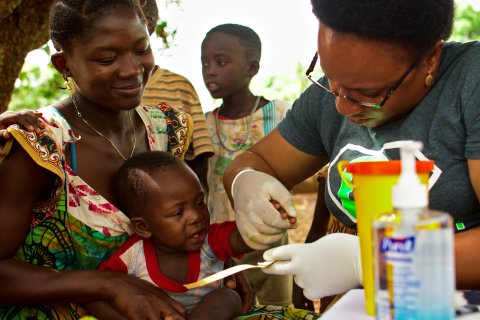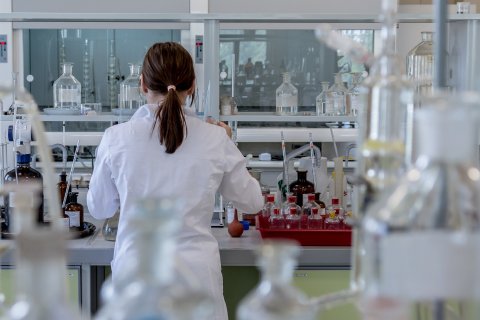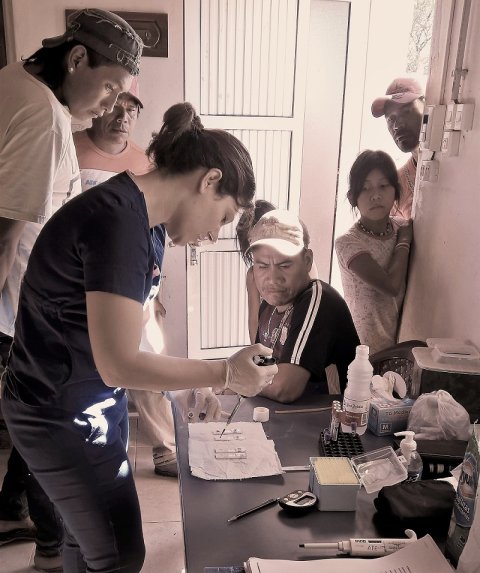International Women's Day 2022: Breaking the bias in global health

Today is International Women’s Day, a global day celebrating the social, economic, cultural, and political achievements of women. The theme for this year is #breakthebias, calling for the acceleration of gender parity.
Today RSTMH is calling for all women who are delivering health to be included at all levels of decision making and leadership. Globally, women comprise almost 70% of health and care workers. Yet, women are not equally represented in decision making positions and women make up only 25% of leadership roles.
The financial value of women’s input into health systems is estimated to be over US$3 trillion annually, according to the World Health Organization. Yet the contribution of women to health and the health labour market are markedly undervalued. Women in health tend to be clustered into lower status, low paid, and often unpaid roles.
It is clear that we, the global health care community, have more to do. The 2021 Global Health 50/50 report Gender Equality: Flying blind in a time of crisis, reviewed the equality and gender-related policies and practices of global organisations in health and health policy. It found that that “although organisations are improving the way they talk about gender equality, very little has changed practically since the first report in 2018, including who holds power in senior leadership positions”.
Furthermore, it found that there were many issues holding women back, including low support for women’s research careers and leadership bids, and lower research outputs, grants, citations, and patents. The report also found that action to dismantle gender inequality inside organisations and to apply a gender lens in health programmes remains scarce. The report said:
Gender inequality is not inevitable; it is made by people and reinforced in systems and organisations, including global health. And it can be unmade within those same systems.”
Gender Equality: Flying blind in a time of crisis
At RSTMH
Our strategy at RSTMH recognises the importance of underlying social, structural, economic and environmental factors that determine health around the globe.
Using the UN Sustainable Development Goals (SDGs) as a framework, we recognise our responsibility to encourage, promote and support women in global health through our activities. Whether they deliver healthcare directly, are social scientists, environmentalists, researchers, students, veterinarians, policymakers or at NGOs, we must support them to create action on gender equity.
Since our first female Fellow joined us in June of 1907, the year RSTMH was formed, we have celebrated and encouraged women within global health and tropical medicine.
Now, in 2022, RSTMH has both a female Chief Executive, Tamar Ghosh, and President, Professor Janet Hemingway. In fact, 3 out of the past 5 presidents have been female, as are 55 per cent of our Medals and Awards Winners throughout our last strategy period (2017-2021). RSTMH has a staff team which is over 80% female, and for those members who have shared their gender, over 40% are female. Likewise, over 40% of our Student Ambassadors are female.
However, we want to encourage more and more women to join our network, whether that is as members, Country Ambassadors, Student Ambassadors, Global Assessors or as contributors to our journals.
Our grants programme

Within our Early Career Grants Programme (formerly called our Small Grants Programme) we want to ensure that women are equally represented to effectively safeguard the next generation of female tropical medicine and global health professionals.
Our 2021 grant cohort saw 47% of grants awarded to females, a 7% improvement from the previous year. The grants are for up to £5,000 and can be on any area of tropical medicine or global health.
We still have a way to go before we close the research gap and so we encourage women to apply for this year’s Early Career Grants funding, which are open until 29 April 2022.
Judith Auma, an RSTMH in partnership with the National Institute for Health Research (NIHR) grant awardee, encourages women and girls to pursue a career in science and global health.
Judith, whose own research project was on cervical cancer prevention in HIV positive women in Uganda, said: “It’s been really important to me, as a young African woman, to be able to do research that empowers young women to take care of their own health and that of their sisters, mothers, daughters and peers. I also hope that I have contributed to a positive role model for women to aspire to becoming researchers and professionals in their own right.
Remember ladies, there is enough room for everyone in science and global health to thrive – choose what you want, pursue and become it. Now is the time!"
Judith Auma
Role models

When we spoke to some of our network for International Day of Women and Girls in Science last month, many of them told us that girls often don’t see female role models in the science and medicine communities, which may lead to only a small number considering these career choices.
Deji Oloko told us: “Many girls do not have access to education, are told ‘physics is for boys’, or do not have any female role models. While nothing can make up for that, there is a network of women who are willing to support girls coming behind them.
The advice I give to women pursuing a career in global health is to strategically ask for help. Reach out to people who have careers you admire, and you’ll be surprised how many are willing to help complete strangers.”
Deji Oloko
Likewise, Nelly Nyaga told us: “In my early years of school, there was a notion among my agemates that science and mathematics were subjects meant for boys while languages and humanities were meant for girls.”
Nelly said that she was lucky enough to have a dad who was a mathematics and physics teacher who believed strongly in educating girls and pushed her to study physics, biology, and chemistry, but that she wishes “that women in all parts of the world debunk the idea that some careers are meant for men”.
How men can play a part
In a Q&A for International Women's Day 2022, Naomi Nyambura Riithi, a previous RSTMH in partnership with the National Institute for Health Research (NIHR) grant awardee, said that for the loop of bias to be broken, men "need to be at the forefront in setting policies that preclude their selfish interest and embrace equality and fairness in the work environment."
It starts when men understand that being in a position of power doesn’t mean using their powers to demean others, but most importantly empowering them to rise to your level"
Naomi Nyambura Riithi
We hope the whole global health and tropical medicine community can come together to help #breakthebias and forge women’s equality while celebrating the significant achievements made by women.
Read more about International Women’s Day and the campaign’s focus on healthcare here.
